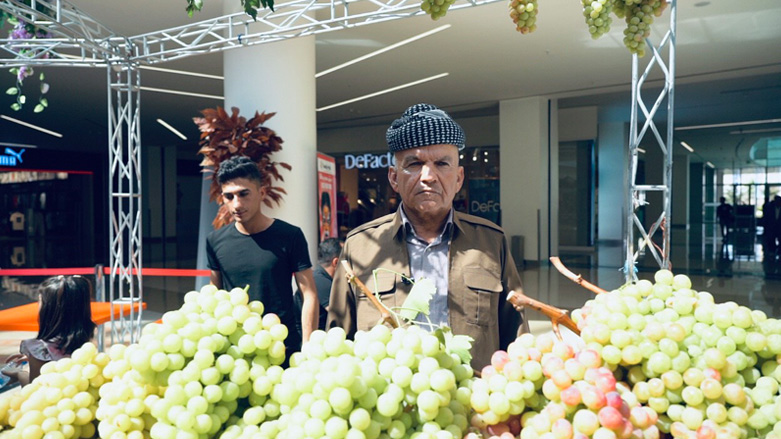A farmer in Duhok grows 50 types of grapes in his farm
Having been a farmer since 1976, Bageri has over 5000 grapevine trees of 50 various types, he told Kurdistan 24 on the sidelines of the fair.

Duhok (Kurdistan 24) – Regarded as an exceptional farmer, a grape grower in Duhok has produced 50 types of grapes on his farm.
Abdulrahman Sleman Bageri has been participating in the annual agricultural fair specifically catered for marketing grapes and honey in Duhok for 15 years. Each year, he is recognized for having the best quality of grapes.
This year's fair, held on Sunday, was attended by Kurdistan Democratic Party (KDP) President Masoud Barzani, who toured around the stands to closely hear the farmers about their products.
Having been a farmer since 1976, Bageri has over 5000 grapevine trees of 50 various types, he told Kurdistan 24 on the sidelines of the fair.

Explaining that the heaviest grape cluster on his farm weighed six kilograms.
First, he started farming by using traditional methods. As times passed and received help from experts and the Kurdistan Regional Government (KRG), he made use of new farming techniques and knowledge that have proved to be helpful.
According to Abdulrahman, the grapes he cultivates, some are indigenous and some foreign; include Bageri, Rasha Bageri, Khatini, Misa Beg, Hajazi, Kamali, Abasi, Tayfi, Yaqoti, Zark, Hilwani, Baid Hamam, as well as Red Globe, French, German and Russian types.
The most demanded types of indigenous grapes are Zarik, Rashmiw, Tayfi and Kamali. Local people usually go for the grape that has a bigger shape. Bageri's favorite type of grapes is what is called Princess.
Each type can have a slightly different price. This year, one kilo of Tayifi grape is sold for 700 to 500 IQD (0.34$-0.47$), Kamali for 1100-600 IQD (0.74$-0.40$), Zeytoni for 1100-900 IQD (0.74$-0.61$).
Duhok province has become Iraq's and Kurdistan Region's center for producing large quantities and best-quality varieties of grapes, as farmers increasingly utilize the favorable conditions for growing the grapevine across the province.
The Duhok Agricultural Directorate figures show that in 2021, the province produced over 77,000 tons of grapes, but this year the drought that hit the region has to some extent negatively affected the quantity and quality of such fruit.

Five million square meters of land in the province are currently planted with grapevine trees.
Besides being eaten as a tasteful fruit, raisin juice is also among the go-to refreshments for many Duhok residents, increasing the demand for the fruit further.
Recognizing the increasing popularity and cultural significance of the fruit tree, Duhok governorate has used grapevine leaf in its logo.
Abulrahman said that the farmers in Duhok produce five times more than the need of the province, so the opening of factories and cold stores as well as facilitation in exporting of grapes is a necessity.
